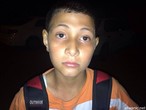2 oct 2015
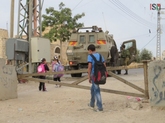
Palestinian schoolchildren forced to squeeze past armored Israeli jeep on their way to school
Monday, Tuesday and Wednesday, the 28th – 30th September 2015 is the Jewish holiday of Sukkot. In the occupied West Bank city of al-Khalil (Hebron), while Israeli settlers from the many illegal settlements within al-Khalil celebrate their holiday, Israeli forces have escalated restrictions and violence against the Palestinian residents, further infringing on their most basic rights.
In preparation for the celebrations of Sukkot, already heavily restricted Palestinian freedom of movement has been almost entirely grinded to a halt by Israeli forces. Especially in the area around the Ibrahimi mosque, food-stalls and entertainment has sprung up for settlers not only from al-Khalil but also visiting from other West Bank illegal settlements. In order to completely barr Palestinians from this main venue of celebration for the settlers and Israeli forces, the mosque checkpoint leading to this area from the Palestinian market has been closed down for two days. Shopkeepers were handed notices by the Israeli army forcing them to again close their shops for the Jewish holiday, imposing more days of forced closures and lost income.
Palestinian schoolchildren forced to squeeze past armored Israeli jeep on their way to school Palestinian schoolchildren forced to squeeze past armored Israeli jeep on their way to school Families that for generations have lived in this neighbourhood directly next to the Ibrahimi mosque are also barred access. Even if not physically prevented from leaving their houses by closed checkpoints or soldiers randomly denying them entry into the area, large crowds of settlers and soldiers right outside their doorsteps pose an immediate threat for leaving the house. With settlers, at times ‘wearing’ machine guns or hand-guns just like an accessoire, known for their attacks on Palestinians, that seem to escalate especially during the Jewish holidays, Palestinian families are locked up in their houses as if under house arrest, caged inside their homes while right outside their doorsteps settlers and soldiers merrily celebrate their holiday together without even having to think about the local families hoping for the holiday to pass as uneventful as possible.
But in most of the cases, that was not the case, with huge groups of settlers flooding into al-Khalil, Israeli forces did everything possible to facilitate their movement. New checkpoints and road-blocks popped up randomly, leaving Palestinians with their cars parked on the wrong side of them without any possibility to access their cars, soldiers took over several Palestinian houses, using their roofs or even the whole house as a military base to ‘keep an eye’ on Palestinians’ every movement in the maze of obstacles, dead-ends and military checkpoints – almost impossible to navigate in every-day life in a militarily occupied city – further exacerbated by this holiday.
Even in the H1-area of al-Khalil, that is supposedly under full Palestinian control, Israeli forces evicted Palestinian civilians going about their everyday lives attacking them with stun-grenades and rubber coated steel bullets, to facilitate access exclusively for Israeli settlers. Sudden attacks like these didn’t allow even for a few minutes for shopkeepers and vendors to protect their produce from violent assaults by Israeli forces or for families and mothers to hurriedly whisk their small children to safety out of the range of indiscriminate fire.
In the area around Bab al-Zawwiyya and Shuhada checkpoint, where Palestinian student Hadeel al-Hashlamoun was ruthlessly gunned down and killed by Israeli soldiers just last week, endless rounds of stun-grenades and rubber coated steel bullets fired at protectors have echoed throughout the days. Israeli forces’ fire has also been directly targeting Palestinian families, with tear gas and stun grenades continuously exploding on the roofs of their homes, leaving them scared and hurriedly closing windows to minimise tear gas slowly seeping into their homes.
In this escalation of violence, harassment, attacks and restrictions, it doesn’t matter if you’re a small child, a grown up adult or an old person. The stepped up ‘security’ is only imposing further hassles and obstacles on Palestinians’ already severely restricted everyday life. Israeli settlers on the other hand, under the watch of the Israeli forces are free to attack Palestinian families and shops or keep them locked up in their home by blocking their front door. And age doesn’t matter in these cases either, while some of the settlers use their children to block international observers’ cameras, other parents encourage them to join the attacks and insults on Palestinian families.
Soldiers idly standing by watching these incidents happen, just a few minutes afterwards, receive pizza delivered by the same settlers or giving them a hug on their way home after their shift is finished. For Palestinians, every day life is children coming home from school crying, coughing and choking from tear gas shot at them by Israeli forces at one of the many checkpoints they have to cross, passing heavily armed military. Every day life is mothers and fathers anxiously waiting for the return of their children from school if they’re late, hoping and praying they were not randomly snatched by Israeli forces and arrested for ‘dirty hands’ that would indicate they were throwing stones – just because children would never play and get dirty hands. Every day life is families having to endure Israeli settlers attacking a son, brother or father with Israeli forces standing by not intervening and later on arresting the person attacked.
Every day life is a struggle against the illegal Israeli military occupation of every aspect of Palestinian life, a daily struggle against the denial of most basic human rights.
Monday, Tuesday and Wednesday, the 28th – 30th September 2015 is the Jewish holiday of Sukkot. In the occupied West Bank city of al-Khalil (Hebron), while Israeli settlers from the many illegal settlements within al-Khalil celebrate their holiday, Israeli forces have escalated restrictions and violence against the Palestinian residents, further infringing on their most basic rights.
In preparation for the celebrations of Sukkot, already heavily restricted Palestinian freedom of movement has been almost entirely grinded to a halt by Israeli forces. Especially in the area around the Ibrahimi mosque, food-stalls and entertainment has sprung up for settlers not only from al-Khalil but also visiting from other West Bank illegal settlements. In order to completely barr Palestinians from this main venue of celebration for the settlers and Israeli forces, the mosque checkpoint leading to this area from the Palestinian market has been closed down for two days. Shopkeepers were handed notices by the Israeli army forcing them to again close their shops for the Jewish holiday, imposing more days of forced closures and lost income.
Palestinian schoolchildren forced to squeeze past armored Israeli jeep on their way to school Palestinian schoolchildren forced to squeeze past armored Israeli jeep on their way to school Families that for generations have lived in this neighbourhood directly next to the Ibrahimi mosque are also barred access. Even if not physically prevented from leaving their houses by closed checkpoints or soldiers randomly denying them entry into the area, large crowds of settlers and soldiers right outside their doorsteps pose an immediate threat for leaving the house. With settlers, at times ‘wearing’ machine guns or hand-guns just like an accessoire, known for their attacks on Palestinians, that seem to escalate especially during the Jewish holidays, Palestinian families are locked up in their houses as if under house arrest, caged inside their homes while right outside their doorsteps settlers and soldiers merrily celebrate their holiday together without even having to think about the local families hoping for the holiday to pass as uneventful as possible.
But in most of the cases, that was not the case, with huge groups of settlers flooding into al-Khalil, Israeli forces did everything possible to facilitate their movement. New checkpoints and road-blocks popped up randomly, leaving Palestinians with their cars parked on the wrong side of them without any possibility to access their cars, soldiers took over several Palestinian houses, using their roofs or even the whole house as a military base to ‘keep an eye’ on Palestinians’ every movement in the maze of obstacles, dead-ends and military checkpoints – almost impossible to navigate in every-day life in a militarily occupied city – further exacerbated by this holiday.
Even in the H1-area of al-Khalil, that is supposedly under full Palestinian control, Israeli forces evicted Palestinian civilians going about their everyday lives attacking them with stun-grenades and rubber coated steel bullets, to facilitate access exclusively for Israeli settlers. Sudden attacks like these didn’t allow even for a few minutes for shopkeepers and vendors to protect their produce from violent assaults by Israeli forces or for families and mothers to hurriedly whisk their small children to safety out of the range of indiscriminate fire.
In the area around Bab al-Zawwiyya and Shuhada checkpoint, where Palestinian student Hadeel al-Hashlamoun was ruthlessly gunned down and killed by Israeli soldiers just last week, endless rounds of stun-grenades and rubber coated steel bullets fired at protectors have echoed throughout the days. Israeli forces’ fire has also been directly targeting Palestinian families, with tear gas and stun grenades continuously exploding on the roofs of their homes, leaving them scared and hurriedly closing windows to minimise tear gas slowly seeping into their homes.
In this escalation of violence, harassment, attacks and restrictions, it doesn’t matter if you’re a small child, a grown up adult or an old person. The stepped up ‘security’ is only imposing further hassles and obstacles on Palestinians’ already severely restricted everyday life. Israeli settlers on the other hand, under the watch of the Israeli forces are free to attack Palestinian families and shops or keep them locked up in their home by blocking their front door. And age doesn’t matter in these cases either, while some of the settlers use their children to block international observers’ cameras, other parents encourage them to join the attacks and insults on Palestinian families.
Soldiers idly standing by watching these incidents happen, just a few minutes afterwards, receive pizza delivered by the same settlers or giving them a hug on their way home after their shift is finished. For Palestinians, every day life is children coming home from school crying, coughing and choking from tear gas shot at them by Israeli forces at one of the many checkpoints they have to cross, passing heavily armed military. Every day life is mothers and fathers anxiously waiting for the return of their children from school if they’re late, hoping and praying they were not randomly snatched by Israeli forces and arrested for ‘dirty hands’ that would indicate they were throwing stones – just because children would never play and get dirty hands. Every day life is families having to endure Israeli settlers attacking a son, brother or father with Israeli forces standing by not intervening and later on arresting the person attacked.
Every day life is a struggle against the illegal Israeli military occupation of every aspect of Palestinian life, a daily struggle against the denial of most basic human rights.
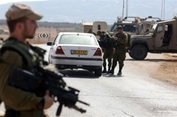
Hundreds of Israeli troops were searching for suspected Palestinian gunmen on Friday, after the killing of a settler couple between the illegal Israeli settlements of Itamar and Elon Moreh, near Nablus, in the northern West Bank, on Thursday evening.
A Ma'an reporter said dozens of Israeli army vehicles were stationed near the Palestinian town of Huwwara and searching vehicles in the area.
The Beit Furik military checkpoint north of the town was closed in both directions, with Palestinian residents prohibited from leaving. Residents told Ma'an that they had been waiting outside at the checkpoint all night to return to their homes.
Israeli soldiers reportedly told residents that the checkpoint was closed to prevent clashes with settlers, who had gathered at the other side of checkpoint and were threatening Palestinians. The Huwwara checkpoint was only open travelling north, with no Palestinian cars allowed through towards the southern West Bank.
Dozens of settlers protested at the Zatara checkpoint in southern Nablus chanting "Death to Arabs" and calling for a response to the killing of the two settlers, as Israeli armed forces were stationed nearby.
Settlers threw rocks at Palestinian vehicles in southern Nablus, witnesses said. Palestinian security sources said the Palestinian side of the Yitzhar-Nablus and Itamar-Alon Moreh roads would be closed to cars until further notice, with all access for Palestinians in and around Nablus highly restricted.
The Palestinian liaison office warned Palestinians not to use roads near Israeli settlements in the Nablus area, after receiving information about large crowds of settlers targeting cars near the Shilo and Yitzhar settlements, as well as the Huwwara and Zatara checkpoints.
Israeli Defense Minister Moshe Yaalon, who visited the attack site on Friday, said the army and security forces had been deployed "to place our hands on the murderers."
In remarks relayed by his office, Yaalon linked recent violence to unrest surrounding Al-Aqsa and also blamed what he termed "incitement" from Palestinian leaders, "especially (Abbas)." Hundreds of Israeli settlers rioted across the occupied West Bank, late Thursday, with multiple attacks reported on Palestinian homes and vehicles in the aftermath of the shooting.
A Palestinian car was set on fire near Ramallah and price-tag graffiti was sprayed on a nearby wall, while hundreds of settlers attempted to raid villages in the Nablus area and threw rocks at Palestinian cars, damaging at least 15, including an ambulance.
Israeli security forces were conducting an "intensive search" on the ground combined with intelligence efforts, said army spokesman Arye Shalicar.
The circumstances surrounding Thursday's attack remain unclear. A group purportedly linked to the Palestinian Fateh movement -- the Abdel Qader al-Husseini Brigades -- claimed responsibility, but this could not be immediately verified.
Eitam and Naama Henkin, both in their 30s, were killed while driving on Thursday night between the illegal settlements of Itamar and Elon More.
Their four children, aged between four months and nine years, were found unharmed in the back of the car.
A Ma'an reporter said dozens of Israeli army vehicles were stationed near the Palestinian town of Huwwara and searching vehicles in the area.
The Beit Furik military checkpoint north of the town was closed in both directions, with Palestinian residents prohibited from leaving. Residents told Ma'an that they had been waiting outside at the checkpoint all night to return to their homes.
Israeli soldiers reportedly told residents that the checkpoint was closed to prevent clashes with settlers, who had gathered at the other side of checkpoint and were threatening Palestinians. The Huwwara checkpoint was only open travelling north, with no Palestinian cars allowed through towards the southern West Bank.
Dozens of settlers protested at the Zatara checkpoint in southern Nablus chanting "Death to Arabs" and calling for a response to the killing of the two settlers, as Israeli armed forces were stationed nearby.
Settlers threw rocks at Palestinian vehicles in southern Nablus, witnesses said. Palestinian security sources said the Palestinian side of the Yitzhar-Nablus and Itamar-Alon Moreh roads would be closed to cars until further notice, with all access for Palestinians in and around Nablus highly restricted.
The Palestinian liaison office warned Palestinians not to use roads near Israeli settlements in the Nablus area, after receiving information about large crowds of settlers targeting cars near the Shilo and Yitzhar settlements, as well as the Huwwara and Zatara checkpoints.
Israeli Defense Minister Moshe Yaalon, who visited the attack site on Friday, said the army and security forces had been deployed "to place our hands on the murderers."
In remarks relayed by his office, Yaalon linked recent violence to unrest surrounding Al-Aqsa and also blamed what he termed "incitement" from Palestinian leaders, "especially (Abbas)." Hundreds of Israeli settlers rioted across the occupied West Bank, late Thursday, with multiple attacks reported on Palestinian homes and vehicles in the aftermath of the shooting.
A Palestinian car was set on fire near Ramallah and price-tag graffiti was sprayed on a nearby wall, while hundreds of settlers attempted to raid villages in the Nablus area and threw rocks at Palestinian cars, damaging at least 15, including an ambulance.
Israeli security forces were conducting an "intensive search" on the ground combined with intelligence efforts, said army spokesman Arye Shalicar.
The circumstances surrounding Thursday's attack remain unclear. A group purportedly linked to the Palestinian Fateh movement -- the Abdel Qader al-Husseini Brigades -- claimed responsibility, but this could not be immediately verified.
Eitam and Naama Henkin, both in their 30s, were killed while driving on Thursday night between the illegal settlements of Itamar and Elon More.
Their four children, aged between four months and nine years, were found unharmed in the back of the car.
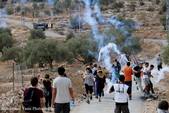
Israeli soldiers attacked, Friday, the weekly nonviolent protest against the Annexation Wall and settlements held by Palestinian residents, Israeli and international peace activists, in Bil'in village, west of the central West Bank city of Ramallah.
The protesters marched from the center of the village, raising Palestinian flags, and chanting against the escalating Israeli attacks and invasions into the Al-Aqsa Mosque, in occupied Jerusalem, and in solidarity with all Palestinian political prisoners.
They carried Palestinian flags, and signs denouncing the Israeli violations against Islamic and Christian holy sites in occupied Palestine, and calling for liberation and independence.
As the protesters reached Palestinian orchards, near the old site of the wall, that was rerouted in 2011, the soldiers started firing rubber-coated metal bullets, gas bombs and concussion grenades, causing scores to suffer the effects of tear gas inhalation.
The Israeli gas bombs and concussion grenades also caused fires in Palestinian olive orchards and farmlands, belonging to resident Rashid Abu Rahma.
Also on Friday, soldiers attacked the weekly nonviolent protest in Kufur Qaddoum, near the northern West Bank city of Qalqilia, wounding three Palestinians, including a journalist, with live fire, while one child was shot with a gas bomb, and many others suffered the effects of tear gas inhalation.
The protesters marched from the center of the village, raising Palestinian flags, and chanting against the escalating Israeli attacks and invasions into the Al-Aqsa Mosque, in occupied Jerusalem, and in solidarity with all Palestinian political prisoners.
They carried Palestinian flags, and signs denouncing the Israeli violations against Islamic and Christian holy sites in occupied Palestine, and calling for liberation and independence.
As the protesters reached Palestinian orchards, near the old site of the wall, that was rerouted in 2011, the soldiers started firing rubber-coated metal bullets, gas bombs and concussion grenades, causing scores to suffer the effects of tear gas inhalation.
The Israeli gas bombs and concussion grenades also caused fires in Palestinian olive orchards and farmlands, belonging to resident Rashid Abu Rahma.
Also on Friday, soldiers attacked the weekly nonviolent protest in Kufur Qaddoum, near the northern West Bank city of Qalqilia, wounding three Palestinians, including a journalist, with live fire, while one child was shot with a gas bomb, and many others suffered the effects of tear gas inhalation.
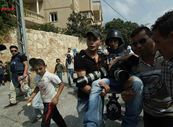
Israeli soldiers attacked, Friday, the weekly nonviolent protest in Kufur Qaddoum, near the northern West Bank city of Qalqilia, wounding three Palestinians, including a journalist, with live fire, while one child was shot with a gas bomb, and many others suffered the effects of tear gas inhalation.
The protesters marched following Friday noon prayers, while chanting for the Al-Aqsa Mosque in occupied Jerusalem, subject to escalating Israeli attacks, and the ongoing violations in the rest of the occupied territories.
They also chanted for liberation and independence, called for the release of all detainees, and in support of the Palestinian diplomatic moves in various international organizations, especially United Nations agencies.
Coordinator of the Popular Committee against the Wall and Settlements in Kufur Qaddoum, Morad Eshteiwy, said the soldiers used excessive force against the nonviolent protesters, wounding Ahmad Tal’at, a cameraman working for the Italian News Agency, with a live round in the leg.
The cameraman was wearing a clearly marked journalism vest, and was carrying three cameras.
The Israeli attack led to clashes between the soldiers, and dozens of local youths, who hurled stones and empty bottles on them.
Soldiers also shot and wounded 'Aref Marwan, 17 years of age, and Nasr 'Aqel, 41, with live rounds in their legs, while Raed Husam, 16, was shot with a gas bomb in the arm.
The four wounded Palestinians received treatment by local medics before being moved to the Rafidia Hospital in Nablus.
Kufur Qaddoum residents, and supporters, hold weekly marches demanding the army to reopen the main road that was blockaded by the army thirteen years ago.
The protesters marched following Friday noon prayers, while chanting for the Al-Aqsa Mosque in occupied Jerusalem, subject to escalating Israeli attacks, and the ongoing violations in the rest of the occupied territories.
They also chanted for liberation and independence, called for the release of all detainees, and in support of the Palestinian diplomatic moves in various international organizations, especially United Nations agencies.
Coordinator of the Popular Committee against the Wall and Settlements in Kufur Qaddoum, Morad Eshteiwy, said the soldiers used excessive force against the nonviolent protesters, wounding Ahmad Tal’at, a cameraman working for the Italian News Agency, with a live round in the leg.
The cameraman was wearing a clearly marked journalism vest, and was carrying three cameras.
The Israeli attack led to clashes between the soldiers, and dozens of local youths, who hurled stones and empty bottles on them.
Soldiers also shot and wounded 'Aref Marwan, 17 years of age, and Nasr 'Aqel, 41, with live rounds in their legs, while Raed Husam, 16, was shot with a gas bomb in the arm.
The four wounded Palestinians received treatment by local medics before being moved to the Rafidia Hospital in Nablus.
Kufur Qaddoum residents, and supporters, hold weekly marches demanding the army to reopen the main road that was blockaded by the army thirteen years ago.
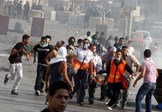
A Palestinian young man on Thursday evening suffered a serious bullet injury when an Israeli soldier opened fire at him in a Palestinian town near Bethlehem.
Local sources said that a young man suffered a bullet injury in his hips as he was standing outside his home in Tuqua town, southeast of Bethlehem, and was rushed to a nearby hospital for treatment.
The incident happened when a large number of Israeli troops stormed, amid intensive gunfire, the town and clashed with local young men in different areas, according to the sources.
Several young men also suffered from inhaling tear gas and one teenager was kidnapped during similar events in different areas of Bethlehem city.
Local sources said that a young man suffered a bullet injury in his hips as he was standing outside his home in Tuqua town, southeast of Bethlehem, and was rushed to a nearby hospital for treatment.
The incident happened when a large number of Israeli troops stormed, amid intensive gunfire, the town and clashed with local young men in different areas, according to the sources.
Several young men also suffered from inhaling tear gas and one teenager was kidnapped during similar events in different areas of Bethlehem city.
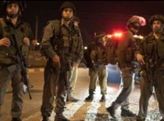
Palestinian medical sources in the northern West Bank district of Nablus have reported that dozens of residents, including a mother and her child, have been injured, on Friday at dawn, in a number of attacks carried out by Israeli extremists targeting homes, while trees were burnt.
The sources said the assailants hurled Molotov cocktails on a Palestinian home, while the family slept, in Burin village, south of Nablus.
The home was partially burnt, while a mother and her child suffocated due to extensive smoke inhalation, and received the needed medical treatment, the Palestinian TV said.
The assailants also burnt several Palestinian trees, belonging to the villagers of Burin.
They also caused damage to at least 15 Palestinian cars, in the Nablus district.
Meanwhile, Israeli soldiers invaded the town, clashed with dozens of local residents and fired live rounds, rubber-coated steel bullets and gas bombs, causing at least four to suffer the effects of tear gas inhalation.
In addition, a number of Israeli extremists tried to attack a home, belonging to resident Marwan Najjar, near the main entrance of Burin, where he lives with four other family members, and caused damage to Palestinian ambulances that rushed to the village.
Medical sources in Nablus told the Maan News Agency that a Palestinian, identified as Jibreel Qadous, and three members of his family, were moved to hospital in Nablus, due to severe effects of tear gas inhalation, in Burin.
One Palestinian was also hurt after Israeli settlers hurled stones on his car, and was moved to a local hospital.
The army pushed hundreds of soldiers into the Nablus district, especially near the Huwwara roadblock, and various areas, southeast of Nablus.
The military said it is operating in the area in the aftermath of the deadly shooting that caused the death of an Israeli settler and his wife, driving with their four children, near the Itamar illegal colony.
In the central West Bank district of Ramallah, medical sources said that several Palestinians, including many children, suffered the effects of tear gas inhalation after the soldiers invaded Sinjel town.
The sources said the assailants hurled Molotov cocktails on a Palestinian home, while the family slept, in Burin village, south of Nablus.
The home was partially burnt, while a mother and her child suffocated due to extensive smoke inhalation, and received the needed medical treatment, the Palestinian TV said.
The assailants also burnt several Palestinian trees, belonging to the villagers of Burin.
They also caused damage to at least 15 Palestinian cars, in the Nablus district.
Meanwhile, Israeli soldiers invaded the town, clashed with dozens of local residents and fired live rounds, rubber-coated steel bullets and gas bombs, causing at least four to suffer the effects of tear gas inhalation.
In addition, a number of Israeli extremists tried to attack a home, belonging to resident Marwan Najjar, near the main entrance of Burin, where he lives with four other family members, and caused damage to Palestinian ambulances that rushed to the village.
Medical sources in Nablus told the Maan News Agency that a Palestinian, identified as Jibreel Qadous, and three members of his family, were moved to hospital in Nablus, due to severe effects of tear gas inhalation, in Burin.
One Palestinian was also hurt after Israeli settlers hurled stones on his car, and was moved to a local hospital.
The army pushed hundreds of soldiers into the Nablus district, especially near the Huwwara roadblock, and various areas, southeast of Nablus.
The military said it is operating in the area in the aftermath of the deadly shooting that caused the death of an Israeli settler and his wife, driving with their four children, near the Itamar illegal colony.
In the central West Bank district of Ramallah, medical sources said that several Palestinians, including many children, suffered the effects of tear gas inhalation after the soldiers invaded Sinjel town.
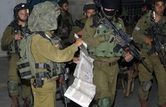
Medical sources have reported, on Friday at dawn, that several Palestinians, including many children, suffered the effects of tear gas inhalation after Israeli soldiers invaded Sinjel town, north of the central West Bank city of Ramallah.
The sources said that dozens of soldiers invaded the town, and clashed with scores of local youths, who hurled atones and empty bottles, while the army fired rounds of live ammunition, and dozens of gas bombs.
Some of the gas bombs directly struck homes in the town, causing many families to suffer the effects of tear gas inhalation.
Dozens of soldiers have also been deployed around Sinjel and the nearby town of Tormos Ayya, after hundreds of settlers gathered there.
In addition, a number of Israeli extremists hurled stones targeting a home, belonging to resident Roshdi Dar Khalil, near the main Sinjel road, causing damage.
They also hurled stones on Palestinian cars, driving near the Beit El illegal settlement, north of Ramallah, and placed nails on the roads to puncture their tires, before throwing stones at them.
In related news, dozens of settlers gathered on Friday at dawn near the Beit Einoun junction, and the eastern entrance of Hebron city, in the southern part of the West Bank, and near Palestinian homes close to the Keryat Arba illegal colony, east of Hebron.
Dozens of soldiers were also deployed in the area, fired rounds of live ammunition, and concussion grenades at Palestinians walking nearby, the Palestinian News & Info Agency said.
The sources said that dozens of soldiers invaded the town, and clashed with scores of local youths, who hurled atones and empty bottles, while the army fired rounds of live ammunition, and dozens of gas bombs.
Some of the gas bombs directly struck homes in the town, causing many families to suffer the effects of tear gas inhalation.
Dozens of soldiers have also been deployed around Sinjel and the nearby town of Tormos Ayya, after hundreds of settlers gathered there.
In addition, a number of Israeli extremists hurled stones targeting a home, belonging to resident Roshdi Dar Khalil, near the main Sinjel road, causing damage.
They also hurled stones on Palestinian cars, driving near the Beit El illegal settlement, north of Ramallah, and placed nails on the roads to puncture their tires, before throwing stones at them.
In related news, dozens of settlers gathered on Friday at dawn near the Beit Einoun junction, and the eastern entrance of Hebron city, in the southern part of the West Bank, and near Palestinian homes close to the Keryat Arba illegal colony, east of Hebron.
Dozens of soldiers were also deployed in the area, fired rounds of live ammunition, and concussion grenades at Palestinians walking nearby, the Palestinian News & Info Agency said.
He added that the soldiers also sprayed several homes and cars with wastewater mixed with chemicals, especially in 'Oleyyan neighborhood, in the center of the town, smashing windows of a number of homes, and fired rubber-coated steel bullets targeting four Palestinian cars.
The Wadi Hilweh Information Center in Silwan (Silwanic) said the soldiers kidnapped a child, identified as Ahmad Shalloudi, 14 years of age, and a young man identified as Amin Abdul-Hai Dari.
In addition, soldiers invaded and searched homes in the Suwwana neighborhood, east of the Old City Walls, kidnapped a child identified as Majd Nael Zada, 15 years of age, as he was leaving a shop next to his home, and another child identified as Waseem Kabaja, 13, as he was walking on the main street in the same neighborhood.
Another child, identified as Abdul-Hadi Abu Ghazala, 11, was kidnapped from his school in the at-Tour village, while Sami Abu Sara, 11, and Sami Ahmad Abu Ghannam, 16, were kidnapped in the village.
Undercover forces invaded Iben Rosh School, in at-Tour, and kidnapped Abu Ghazala, and summoned several other children for interrogation.
The soldiers attacked the child and were shouting and cursing at him, wounding him and causing him to suffer an anxiety attack.
On Thursday afternoon, soldiers invaded various neighborhoods in the Old City, attacked several Palestinians, and kidnapped two, including one teen.
In related news, a Palestinian child, Abdul-Rahman Abu Rayyaleh, only five years of age, is still recovering from an injury he suffered, last Tuesday, after the soldiers shot him with a rubber-coated steel bullet in his thigh, while standing in front of his home in al-'Eesawiyya town.
The child has since been suffering anxiety attacks, unable to sleep properly, and is constantly asking his family "why did they [the soldiers] shoot me?" especially since there were no clashes at the time of the invasion, and the shooting.
On Thursday at dawn, soldiers invaded various Palestinian neighborhoods and towns in occupied East Jerusalem, searched homes and attacked families, wounding several Palestinians, and kidnapped twelve residents. The soldiers also fired rubber-coated steels bullets inside an invaded home, wounding one Palestinian.
The Wadi Hilweh Information Center in Silwan (Silwanic) said the soldiers kidnapped a child, identified as Ahmad Shalloudi, 14 years of age, and a young man identified as Amin Abdul-Hai Dari.
In addition, soldiers invaded and searched homes in the Suwwana neighborhood, east of the Old City Walls, kidnapped a child identified as Majd Nael Zada, 15 years of age, as he was leaving a shop next to his home, and another child identified as Waseem Kabaja, 13, as he was walking on the main street in the same neighborhood.
Another child, identified as Abdul-Hadi Abu Ghazala, 11, was kidnapped from his school in the at-Tour village, while Sami Abu Sara, 11, and Sami Ahmad Abu Ghannam, 16, were kidnapped in the village.
Undercover forces invaded Iben Rosh School, in at-Tour, and kidnapped Abu Ghazala, and summoned several other children for interrogation.
The soldiers attacked the child and were shouting and cursing at him, wounding him and causing him to suffer an anxiety attack.
On Thursday afternoon, soldiers invaded various neighborhoods in the Old City, attacked several Palestinians, and kidnapped two, including one teen.
In related news, a Palestinian child, Abdul-Rahman Abu Rayyaleh, only five years of age, is still recovering from an injury he suffered, last Tuesday, after the soldiers shot him with a rubber-coated steel bullet in his thigh, while standing in front of his home in al-'Eesawiyya town.
The child has since been suffering anxiety attacks, unable to sleep properly, and is constantly asking his family "why did they [the soldiers] shoot me?" especially since there were no clashes at the time of the invasion, and the shooting.
On Thursday at dawn, soldiers invaded various Palestinian neighborhoods and towns in occupied East Jerusalem, searched homes and attacked families, wounding several Palestinians, and kidnapped twelve residents. The soldiers also fired rubber-coated steels bullets inside an invaded home, wounding one Palestinian.
1 oct 2015
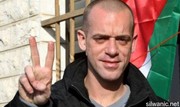
Salah Hammouri
The Israeli army issued, Thursday, a military order occupying a Palestinian home in Halhoul town, north of Hebron, in the southern part of the occupied West Bank. The property owner lives in the United States.
Media sources in Hebron said the soldiers occupied the home of Fathi Mohammad Mer'eb, in the northern part of Halhoul town, and that the illegally seized property is located next to the Karmie Tzur illegal colony, built in private Palestinian lands.
The sources said Mer'eb lives in the United States, and that the soldiers stormed the property while his nephew, Nidal Samih Karaja, was there, and handed him an order informing the family that the military will be "taking control of the property for military considerations."
On Thursday at dawn, dozens of soldiers invaded various Palestinian neighborhoods and towns in occupied East Jerusalem, searched homes and attacked families, wounding several residents, before kidnapping twelve Palestinians, and fired rubber-coated steel bullets inside an invaded home, wounding one.
On Wednesday at night, soldiers kidnapped two Palestinians in the in Einabous village, south of the northern West Bank city of Nablus, and violently assaulted another Palestinian in Madama village south of Nablus.
Earlier Wednesday, soldiers kidnapped 15 Palestinians, including children, in occupied East Jerusalem, wounded one in Hebron and kidnapped a Third in Surif.
On Tuesday, soldiers handed a former political prisoner, identified as Salah Hammouri, a military ordered preventing him from entering the West Bank for six months.
Amjad Abu 'Asab, head of the Jerusalem Detainees Committee, said the soldiers interrogated Hammouri in the al-Maskobiyya Interrogation Center in West Jerusalem, and handed him an order preventing him from entering the west Bank until March 21, 2016.
The Israeli army issued, Thursday, a military order occupying a Palestinian home in Halhoul town, north of Hebron, in the southern part of the occupied West Bank. The property owner lives in the United States.
Media sources in Hebron said the soldiers occupied the home of Fathi Mohammad Mer'eb, in the northern part of Halhoul town, and that the illegally seized property is located next to the Karmie Tzur illegal colony, built in private Palestinian lands.
The sources said Mer'eb lives in the United States, and that the soldiers stormed the property while his nephew, Nidal Samih Karaja, was there, and handed him an order informing the family that the military will be "taking control of the property for military considerations."
On Thursday at dawn, dozens of soldiers invaded various Palestinian neighborhoods and towns in occupied East Jerusalem, searched homes and attacked families, wounding several residents, before kidnapping twelve Palestinians, and fired rubber-coated steel bullets inside an invaded home, wounding one.
On Wednesday at night, soldiers kidnapped two Palestinians in the in Einabous village, south of the northern West Bank city of Nablus, and violently assaulted another Palestinian in Madama village south of Nablus.
Earlier Wednesday, soldiers kidnapped 15 Palestinians, including children, in occupied East Jerusalem, wounded one in Hebron and kidnapped a Third in Surif.
On Tuesday, soldiers handed a former political prisoner, identified as Salah Hammouri, a military ordered preventing him from entering the West Bank for six months.
Amjad Abu 'Asab, head of the Jerusalem Detainees Committee, said the soldiers interrogated Hammouri in the al-Maskobiyya Interrogation Center in West Jerusalem, and handed him an order preventing him from entering the west Bank until March 21, 2016.
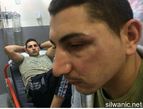
Dozens of Israeli soldiers invaded, on Thursday at dawn, various Palestinian neighborhoods and towns in occupied East Jerusalem, searched homes and attacked families, wounding several Palestinians, and kidnapped twelve. The soldiers also fired rubber-coated steels bullets inside an invaded homes, wounding one Palestinian.
The Wadi Hilweh Information Center in Silwan (Silwanic) said the soldiers invaded Ein al-Lousa neighborhood in Silwan town, and assaulted an elderly man, identified as 'Ali al-Hajj Khalil, 61 years of age, and his wife, before kidnapping their son Ali, 16 years of age.
The soldiers cuffed Ali, blindfolded him, and took him to their vehicle without even allowing him to wear his shoes.
Members of the family said the soldiers fired rubber-coated steel bullets in their home, wounding Mohammad Khalil al-'Abbassi, 23 years of age, in the leg while sitting in the living room.
They added that the soldiers also smashed the door of the family toilet room, while 'Aaed al-'Abbassi, 25, was using it, and repeatedly beat him.
The army also used dogs while violently searching the property, causing Aya al-'Abbassi, 12 years of age, to suffer an anxiety attack.
The soldiers surrounded the entire property, and threatened to attack and kidnap any Palestinian who approaches it.
Silwanic stated that the soldiers kidnapped Mohammad Wa'el Da'na, 16, after invading and searching his family's home, in Silwan.
In addition, soldiers stormed and violently searched homes in al-'Eesawiyya town, in Jerusalem, and kidnapped twelve young Palestinians, including children.
Mohammad Mahmoud of the Ad-Dameer Prisoners' Support and Human Rights Association, said the soldiers kidnapped Tamer 'Obeid, Younis 'Oleyyan, Rami 'Oleyyan, Sami 'Oleyyan, Yousef 'Oleyyan, Karim Darweesh, Ahmad Darweesh, Mohammad Darweesh, Anas Darweesh, and 'Ala Mustafa.
Silwanic said the soldiers detonated the main door of Tamer Oleyyan's home, and attacked the family, before firing rubber-coated steel bullets in the property.
On Wednesday at night, soldiers kidnapped two Palestinians in the in Einabous village, south of the northern West Bank city of Nablus, and violently assaulted another Palestinian in Madama village south of Nablus.
Earlier Wednesday, soldiers kidnapped 15 Palestinians, including children, in occupied East Jerusalem, wounded one in Hebron and kidnapped a Third in Surif.
On Tuesday, soldiers handed a former political prisoner, identified as Salah Hammouri, a military order preventing him from entering the West Bank for six months.
Amjad Abu 'Asab, head of the Jerusalem Detainees Committee, said the soldiers interrogated Hammouri in the al-Maskobiyya Interrogation Center in West Jerusalem, and handed him an order preventing him from entering the West Bank until March 21, 2016.
The Wadi Hilweh Information Center in Silwan (Silwanic) said the soldiers invaded Ein al-Lousa neighborhood in Silwan town, and assaulted an elderly man, identified as 'Ali al-Hajj Khalil, 61 years of age, and his wife, before kidnapping their son Ali, 16 years of age.
The soldiers cuffed Ali, blindfolded him, and took him to their vehicle without even allowing him to wear his shoes.
Members of the family said the soldiers fired rubber-coated steel bullets in their home, wounding Mohammad Khalil al-'Abbassi, 23 years of age, in the leg while sitting in the living room.
They added that the soldiers also smashed the door of the family toilet room, while 'Aaed al-'Abbassi, 25, was using it, and repeatedly beat him.
The army also used dogs while violently searching the property, causing Aya al-'Abbassi, 12 years of age, to suffer an anxiety attack.
The soldiers surrounded the entire property, and threatened to attack and kidnap any Palestinian who approaches it.
Silwanic stated that the soldiers kidnapped Mohammad Wa'el Da'na, 16, after invading and searching his family's home, in Silwan.
In addition, soldiers stormed and violently searched homes in al-'Eesawiyya town, in Jerusalem, and kidnapped twelve young Palestinians, including children.
Mohammad Mahmoud of the Ad-Dameer Prisoners' Support and Human Rights Association, said the soldiers kidnapped Tamer 'Obeid, Younis 'Oleyyan, Rami 'Oleyyan, Sami 'Oleyyan, Yousef 'Oleyyan, Karim Darweesh, Ahmad Darweesh, Mohammad Darweesh, Anas Darweesh, and 'Ala Mustafa.
Silwanic said the soldiers detonated the main door of Tamer Oleyyan's home, and attacked the family, before firing rubber-coated steel bullets in the property.
On Wednesday at night, soldiers kidnapped two Palestinians in the in Einabous village, south of the northern West Bank city of Nablus, and violently assaulted another Palestinian in Madama village south of Nablus.
Earlier Wednesday, soldiers kidnapped 15 Palestinians, including children, in occupied East Jerusalem, wounded one in Hebron and kidnapped a Third in Surif.
On Tuesday, soldiers handed a former political prisoner, identified as Salah Hammouri, a military order preventing him from entering the West Bank for six months.
Amjad Abu 'Asab, head of the Jerusalem Detainees Committee, said the soldiers interrogated Hammouri in the al-Maskobiyya Interrogation Center in West Jerusalem, and handed him an order preventing him from entering the West Bank until March 21, 2016.
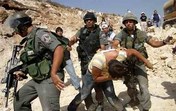
A Palestinian young man on Wednesday night suffered a bullet injury when Israeli soldiers opened fire at him on allegations of his attempt to stab one of them at a military checkpoint to the east of Tulkarem city.
According to the Hebrew radio, the soldier did not suffer any injury in the attack, which occurred last night at Annab checkpoint.
Consequently, the Israeli occupation army intensified its presence and measures at the checkpoint following the incident.
The identity of the attacker, however, is still unknown.
According to the Hebrew radio, the soldier did not suffer any injury in the attack, which occurred last night at Annab checkpoint.
Consequently, the Israeli occupation army intensified its presence and measures at the checkpoint following the incident.
The identity of the attacker, however, is still unknown.

A number of Palestinian civilians sustained critical bruises at dawn Thursday after they were aggressively attacked by the Israeli occupation forces (IOF) deployed at the Anab checkpoint, near the northern West Bank province of Tulkarem.
According to local sources, four Palestinian civilians were rushed to the Khalil Suleiman public hospital in Jenin to be urgently treated for the wounds and bruises they sustained after they were heavily beaten by the Israeli occupation troops at the crack of dawn.
The same sources added that the IOF kidnapped the Palestinian citizen Abdullah Nayef Mara’ba, who accompanied the four casualties, and dragged him to an unidentified destination shortly after they aggressively beat him up.
Palestinian civilians and workers have often been subject to physical and verbal assaults by the Israeli occupation soldiers deployed at military checkpoints.
According to local sources, four Palestinian civilians were rushed to the Khalil Suleiman public hospital in Jenin to be urgently treated for the wounds and bruises they sustained after they were heavily beaten by the Israeli occupation troops at the crack of dawn.
The same sources added that the IOF kidnapped the Palestinian citizen Abdullah Nayef Mara’ba, who accompanied the four casualties, and dragged him to an unidentified destination shortly after they aggressively beat him up.
Palestinian civilians and workers have often been subject to physical and verbal assaults by the Israeli occupation soldiers deployed at military checkpoints.
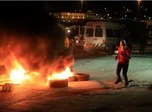
The Israeli occupation police on Wednesday evening violently clashed with Palestinian young men in different areas of Occupied Jerusalem and wounded several of them.
An eyewitness reported that the clashes broke out when policemen attacked a march in support of the Aqsa Mosque near a roadblock in Hizma town, east of Jerusalem.
He added that several young men suffered from inhaling tear gas during the police attack.
Skirmishes also took place between young men and police forces in Wadi Joz neighborhood in the holy city. One young man was arrested in the events.
Two kids were also taken prisoners by the police during a campaign in Attour neighborhood in the city on allegations of throwing stones at their forces as well as a settler's car in the area.
In al-Eizariya town, angry pro-Aqsa young men blocked some roads with burning tires and engaged in confrontations for several hours with police troops, who intensively used stun and tear gas grenades to disperse them.
Meanwhile, a settlement outpost in the Old City of Jerusalem was attacked with three Molotov cocktails, with no reported casualties.
In another incident, Israeli policemen assaulted Muslim worshipers under age 50 as they were trying to enter the Aqsa Mosque for evening prayers.
An eyewitness reported that the clashes broke out when policemen attacked a march in support of the Aqsa Mosque near a roadblock in Hizma town, east of Jerusalem.
He added that several young men suffered from inhaling tear gas during the police attack.
Skirmishes also took place between young men and police forces in Wadi Joz neighborhood in the holy city. One young man was arrested in the events.
Two kids were also taken prisoners by the police during a campaign in Attour neighborhood in the city on allegations of throwing stones at their forces as well as a settler's car in the area.
In al-Eizariya town, angry pro-Aqsa young men blocked some roads with burning tires and engaged in confrontations for several hours with police troops, who intensively used stun and tear gas grenades to disperse them.
Meanwhile, a settlement outpost in the Old City of Jerusalem was attacked with three Molotov cocktails, with no reported casualties.
In another incident, Israeli policemen assaulted Muslim worshipers under age 50 as they were trying to enter the Aqsa Mosque for evening prayers.

The Global Movement for the Defense of Children reported that four Palestinian children were shot by Israeli gunfire during September in the West Bank and Occupied Jerusalem.
The Movement branch in Palestine said, in a press statement on Tuesday, the children were shot by Israeli rubber bullets in the upper parts of their bodies. This has brought the number of Palestinian minors who were shot by rubber bullets since June, 2014 to nine, it pointed out.
Three of the nine minors suffer permanent disabilities, while one of them died later on of sustained wounds.
Ayed Qteish, the manager of the accountability program at the global organization, said that targeting the upper parts of the body with this kind of bullets indicates that Israel has a systematic policy to deliberately hurt Palestinians including children.
The Movement branch in Palestine said, in a press statement on Tuesday, the children were shot by Israeli rubber bullets in the upper parts of their bodies. This has brought the number of Palestinian minors who were shot by rubber bullets since June, 2014 to nine, it pointed out.
Three of the nine minors suffer permanent disabilities, while one of them died later on of sustained wounds.
Ayed Qteish, the manager of the accountability program at the global organization, said that targeting the upper parts of the body with this kind of bullets indicates that Israel has a systematic policy to deliberately hurt Palestinians including children.
